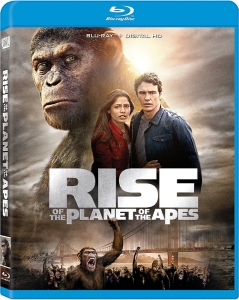A cool thing about science fiction novels is that not only do they explore future possibilities, they also inspire other writers’ imaginations; sometimes one writer’s little idea leads to a whole line of fictional exploration he didn’t originally intend.
The now-sprawling “Planet of the Apes” franchise is a case in point. When Peirre Boulle wrote the imaginative time-travel novel “Planet of the Apes” in 1963, he probably didn’t foresee that it would inspire seven films and two TV series.
Start to finish, the original 1968 movie has withstood the test of time, although it is mostly remembered for the twist ending where the astronaut played by Charlton Heston realizes he is on the Earth in the future, only apes rule now, having passed nuclear-weapon-crazed humans in the evolutionary race. Boulle’s book also had a twist ending, although it was somewhat different.
Then Tim Burton relaunched the franchise with another Boulle adaptation in 2001; I don’t remember the details of that film, but I recall that it was pretty decent up until a bizarre — there it is again — twist ending.
Now we get “Rise of the Planet of the Apes,” which I originally thought was a prequel to Burton’s film but later found out is the third launch of an “Apes” franchise. While Boulle’s book and the ’68 and ’01 film adaptations used intelligent apes as a metaphorical warning and rebuke of where the human race might be headed, once we adjusted to the idea of intelligent apes (and thanks to the groundbreaking makeup work in the ’68 film, it was easy to adjust), it led to an obvious question: How did the apes gain intelligence in the first place?
The lightly regarded “Conquest of the Planet of the Apes” (1972; a 5.8 rating on IMDB, compared to an 8.0 for the original) explored that question in the original franchise continuity, and now “Rise of the Planet of the Apes” uses it a springboard for a moving, character piece that nonetheless closes with an epic battle through the streets and bridges of San Francisco. Andy Serkis gained fame for bringing “Lord of the Rings’ “ Gollum to life (helped by animators, of course), but that was a gimmicky, one-note character. In “Rise,” his Caesar (the same name that was used for “Conquest’s” protagonist) gets a full-on character arc that should earn Serkis and the animation team a bevy of awards. Even though the super-intelligent chimp doesn’t do much communicating through spoken or signed language, we still get to know him.
Although “Rise” literally shows us how the apes gain intelligence and surpass humans as Earth’s rulers, the yarn unfolds on a comfortably small scale. A scientist, Will (James Franco), just wants to cure his dad’s (John Lithgow) Alzheimer’s; the medicine is tested on chimpanzees, and it works: It alters their brains and makes them more intelligent. Even when Will’s boss shuts down the project, Will smuggles home baby Caesar, whom he can’t bear to euthanize, and raises him.
The first half of “Rise” hits all the touchstones in the wealth of literature — much of it based on true stories — about chimps raised in human culture, but the expressive performance of Serkis, combined with the likable Franco and the gorgeous Freida Pinto (“Slumdog Millionaire”) as Will’s girlfriend, holds your attention.
This film doesn’t merely use the Alzheimer’s medicine as a magic bullet to create super-smart chimps; that’s merely the starting point, because “Rise” next becomes a prison movie with apes. In a primate shelter that actually functions like a prison (complete with a playground that’s essentially a prison yard) to hold the animals before they are sold for lab testing, Caesar begins to plot the uprising against his human enslavers.
“Rise” is a bit heavy-handed in portraying the enslavers: Brian Cox, as the warden, is suspiciously slimy; and “Harry Potter’s” Tom Felton is irredeemably over-the-top in his nastiness. I suppose the filmmakers want to make it abundantly clear that here we are supposed to be rooting for the apes, whereas in the original films we were naturally rooting for the humans.
If you want more subtlety in your ape films, you’d probably be better off checking out the documentary “Project Nim” when it hits DVD; I’ve heard good things about it. And even the 1968 film didn’t really traffic in “good guys and bad guys”; viewers’ feelings were allowed to change over the course of the story.
Still, “Rise of the Planet of the Apes” is a smart, affecting summer blockbuster that respects its revered roots that go back nearly a half-century.
What are your thoughts on “Rise of the Planet of the Apes?” Share your thoughts below.


